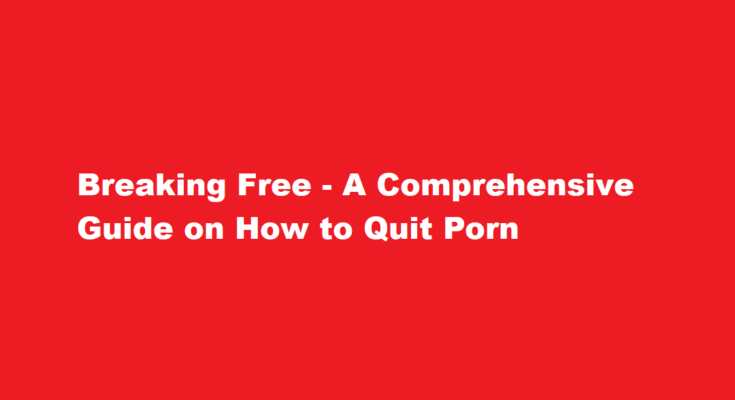Introduction
The proliferation of internet pornography has led to a growing concern for many individuals who find themselves caught in its addictive grip. Quitting porn can be a challenging journey, but it’s a crucial step toward regaining control over your life, relationships, and mental well-being. This article provides a comprehensive guide on how to quit porn, offering practical strategies and insights to help you succeed on this transformative path.
Understanding the Problem
To effectively quit porn, it’s essential to acknowledge the problem and understand its negative impacts. Porn addiction can lead to various consequences, such as reduced self-esteem, distorted views of intimacy, relationship issues, and even interference with daily life responsibilities. Recognizing the harm it causes is the first step towards change.
1. Self-awareness: Start by evaluating your relationship with porn honestly. Ask yourself how frequently you consume it, why you do it, and what effects it has on your life. This self-awareness is crucial for motivating change.
2. Consequences: Reflect on the negative consequences you’ve experienced due to your porn consumption. Write down these consequences and revisit them when you’re tempted to relapse.
Setting Clear Goals
Quitting porn is a personal journey, and setting clear, achievable goals is vital. These goals will help you stay motivated and provide a sense of direction.
1. Define your goals: Decide what quitting porn means to you. Is it complete abstinence or reduced consumption? Be specific about your objectives.
2. Short-term and long-term goals: Create a list of short-term milestones and long-term goals to measure your progress. Short-term goals might include going one week without porn, while long-term goals could be several months or years of abstinence.
3. Write it down: Document your goals and keep them visible. Writing down your goals reinforces your commitment to quitting porn.
Managing Triggers and Cravings
Porn addiction is often triggered by specific situations, emotions, or environmental cues. Identifying and managing these triggers is crucial in your journey to quit porn.
1. Identify triggers: Pay attention to situations, emotions, or thoughts that lead to the urge to consume porn. Common triggers include stress, loneliness, boredom, and exposure to explicit content.
2. Create a plan: Develop a plan to manage these triggers when they arise. This could involve engaging in a distracting activity, calling a friend, or practicing relaxation techniques.
3. Block access: Install website blockers or parental control software to restrict access to explicit content. This makes it more difficult to act on your cravings.
Seeking Support
Quitting porn can be a challenging endeavor, and seeking support can be immensely beneficial. Share your journey with trusted friends, family members, or a therapist who can provide encouragement and accountability.
1. Open up: Don’t hesitate to confide in someone you trust about your struggle to quit porn. Talking about it can alleviate feelings of shame and isolation.
2. Support groups: Consider joining support groups or online communities specifically focused on overcoming porn addiction. These communities provide a platform to share experiences, strategies, and encouragement.
3. Professional help: If your addiction is severely affecting your life, it may be necessary to consult a therapist or counselor who specializes in addiction treatment.
Building Healthy Habits
Breaking free from porn addiction requires more than just quitting; it also involves replacing negative habits with positive ones.
1. Find new interests: Explore new hobbies and interests to fill the void left by porn. Engaging in activities you enjoy can be a powerful distraction from cravings.
2. Exercise regularly: Physical activity not only helps release endorphins but also reduces stress and boosts self-esteem, making it an effective way to combat porn addiction.
3. Improve your self-care: Prioritize self-care practices, such as a balanced diet, adequate sleep, and mindfulness techniques. A healthy body and mind are more resilient against addiction.
Monitoring Progress
To stay on track, it’s crucial to monitor your progress and make adjustments as needed.
1. Keep a journal: Maintain a journal to track your journey. Note your achievements, setbacks, and feelings to gain insight into your triggers and emotional patterns.
2. Celebrate successes: Acknowledge and celebrate your milestones, both small and big. Reward yourself for your efforts and perseverance.
3. Learn from relapses: Relapses are a part of the recovery process. Instead of feeling defeated, analyze what led to the relapse and use it as a learning opportunity to make necessary adjustments.
FREQUENTLY ASKED QUESTIONS
When Does Watching Porn Become a Problem?
If you come across these signs in yourself, your friend, or your partner, it is important to talk to them and help them navigate through this struggling situation with proper care and attention.
When is Watching Porn Not Problematic?
Watching porn is not a problem when it is done in moderation and in balance. When it does not get in between your daily functioning and you are able to handle all of your other tasks properly, watching porn is not an issue.
Conclusion
Quitting porn is a journey that requires commitment, self-awareness, and a strong support system. Understanding the problem, setting clear goals, managing triggers, seeking support, building healthy habits, and monitoring progress are essential steps toward breaking free from porn addiction. Remember, recovery is a process, and setbacks are a natural part of it. Stay persistent, and with time and effort, you can reclaim your life, relationships, and mental well-being. You have the power to make a positive change, and the journey to quit porn is a significant step toward a healthier, happier future.
Read Also : How to Tell If a Papaya Is Ripe A Guide to Perfectly Ripened Papayas



